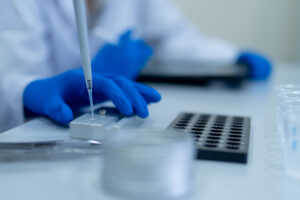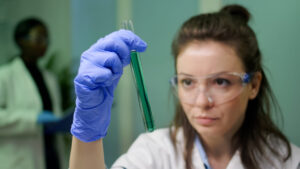What and why?
Genetic screening in newborns is essential for identifying up to 50 genetic, metabolic, hormonal, and hemoglobin diseases that may have serious, potentially life-threatening consequences for a newborn in the first few weeks or months of their life, but which are not necessarily identifiable from their potential symptoms alone.
What exactly is genetic screening in a newborn?
Genetic screening in a newborn usually occurs within 24 hours of birth. It is a standardized screening that all newborns born in the US receive.
It involves taking four drops of blood from the heel of the newborn. This is then tested, and results are usually available within the first week of an infant’s life. Generally, if all of the tests are clear, parents will not be notified of the results.
Genetic screening in a newborn aims to identify potential genetic, and other types of syndromes, that might not be easily identifiable at birth from just their symptoms alone. They tend also to be serious conditions that require swift and early intervention, and treatment, to ensure positive and long-term health outcomes for newborns affected by them.
What does genetic screening in a newborn test for?
Genetic testing of newborns can identify up to 50 possible conditions. The exact number and type varies from state to state within the US, for example. Generally, however, it screens for the following types of conditions:
Metabolic
The body’s metabolism is responsible for converting energy from food into energy that helps our bodies run. Missing or faulty enzymes can affect how well our body does this, and can lead to the development of metabolic syndromes, such as Phenylketonuria.
Hormonal
These types of conditions are caused when our glands create too much of, or too little, of specific hormones, which in turn can lead to serious conditions such as hypothyroidism.
Hemoglobin conditions
Hemoglobin, a protein found in red blood cells, is what helps move oxygen around our bodies. Examples of these types of conditions that might affect newborns include sickle cell anemia and beta thalassemia.
Genetic syndromes
While not a comprehensive genetic screening test, newborn testing can identify some genetic syndromes, including cystic fibrosis, spinal muscular atrophy, and mucopolysaccharides 1.
Genetic screening in a newborn – the next step
Newborns who receive a negative screening, will not require further testing or intervention unless symptoms appear later in life.
For newborns who receive a positive test result, the first step will be for their parents to meet with a genetic counselor. This counselor may specialize in pediatric genetics, or if not available, parents may be referred to a general genetic counselor.
The role of the genetic counselor following a positive newborn screening test result will be to:
- Explain the screening result for parents, including translating any medical language and terms, and what it might mean in terms of their child’s short and long-term health
- Provide the parents with as much information and knowledge as possible about the condition their child has
- Connect the parents with support groups and networks for their child’s specific condition
- Bring together all of the medical professionals involved in the care of an infant with a specific condition, to ensure continuity of care
- Recommend further testing, where necessary, to confirm a diagnosis
- Recommend options for treatment and long-term management of a condition
- Help the parents understand what can be done, if anything, to prevent the same condition in a future pregnancy (this is mainly relevant to inherited genetic syndromes)
- Provide the parents with much-needed emotional and mental support, through what is a challenging process, while at the same time addressing any worries they may have about their newborn and their health
Genetic newborn screening is important in diagnosing serious conditions in infants, within the first few hours of birth. As important is making sure that parents, facing a diagnosis in their newborn, receive the support they need to understand, manage, and come to terms with their child’s condition. Receiving a positive diagnosis in a newborn is a very difficult situation for new parents, and providing them with the very best support system possible is essential.



